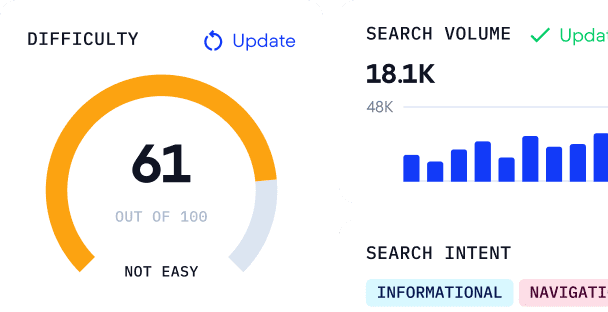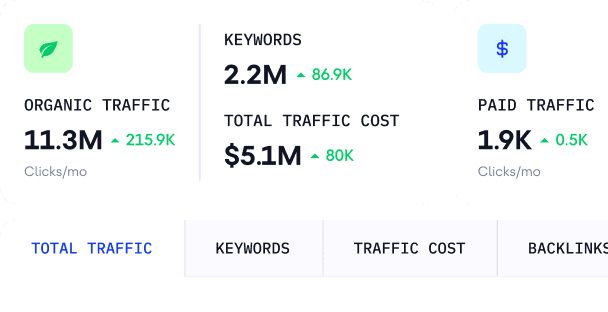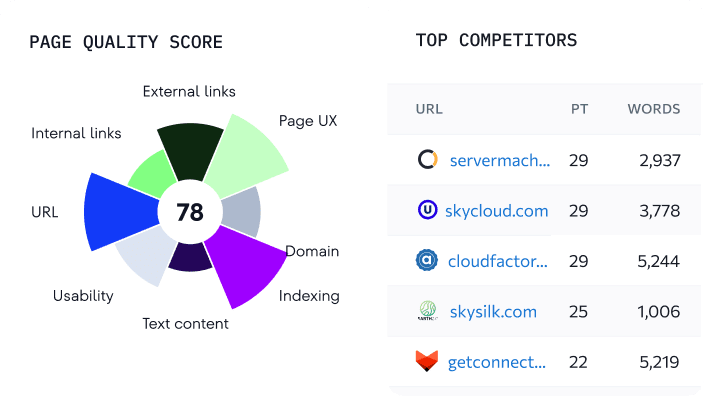AI for SEO: Automating Your Website Optimization Tasks
In 2023, AI shook up the digital world, becoming an integral part of our daily work routines. AI is gaining even more traction in 2025, as it is being integrated into search engines and an increasing number of digital tools. It’s currently at the peak of its popularity.
In this article, we’ll share why using AI for SEO is crucial today. We’ll walk you through practical ways to incorporate AI into different aspects of SEO, covering technical website optimization, content creation, and competitor analysis, with real-life use case examples for different AI tools.
Let’s dive in!
AI in SEO is important
According to a HubSpot report, 54% of SEO professionals incorporate AI into their roles.
It saves teams valuable time on manual tasks, making their workflow more efficient and allowing them to focus on other crucial aspects of optimization. This includes things like making data-driven decisions for SEO or other creative aspects within their role.
According to the Search Engine Journal’s State of SEO 2024 Agency Report, SEO agencies see generative AI as the second most crucial opportunity for businesses and as a vital professional development area. However, the report also states that the rapid onset of new technologies ranks fourth on the list of the top barriers to SEO success.
AI has changed the way we search for information in search engines. For instance, Google is not standing still and actively utilizes generative AI to display search results. Google AI Overviews (ex-SGE) is a shining example. SE Ranking’s research on AI Overviews revealed that:
- The presence of AI Overview in US SERPs exceeded the peak recorded in early 2024 under the Search Labs experiment, reaching an 18.76% occurrence rate in November 2024.
- Long-tail keywords consistently triggered AI Overviews, with queries of 4+ words resulting in AIOs 60.85% of the time in November.
- In 92.36% of cases, AI Overviews link to at least one domain that ranks in the top 10.
We will explore what AI Overviews are in more detail in the following section.
To stay ahead of the curve, SEO professionals and businesses must embrace these changes and adapt their SEO strategies to them. This is also the most effective way to leverage the benefits brought by artificial intelligence.
What role does AI play in SEO?
Nowadays, AI and SEO are closely connected. You can see AI’s impact from two angles: how SEO professionals work with it and how search engines use it.
AI in search engines
Google and Bing are now using artificial intelligence to generate search results.
If you have a Google Labs account, you have probably already seen Google’s AI Overviews in your search results. These AI-powered snippets appear at the top of the Google SERP and offer an immediate, extended answer to the user’s query. The URLs of the sites used to corroborate the response can also be seen next to these AI snippets. To generate them, Google uses a variety of LLMs, including MUM and PaLM2.
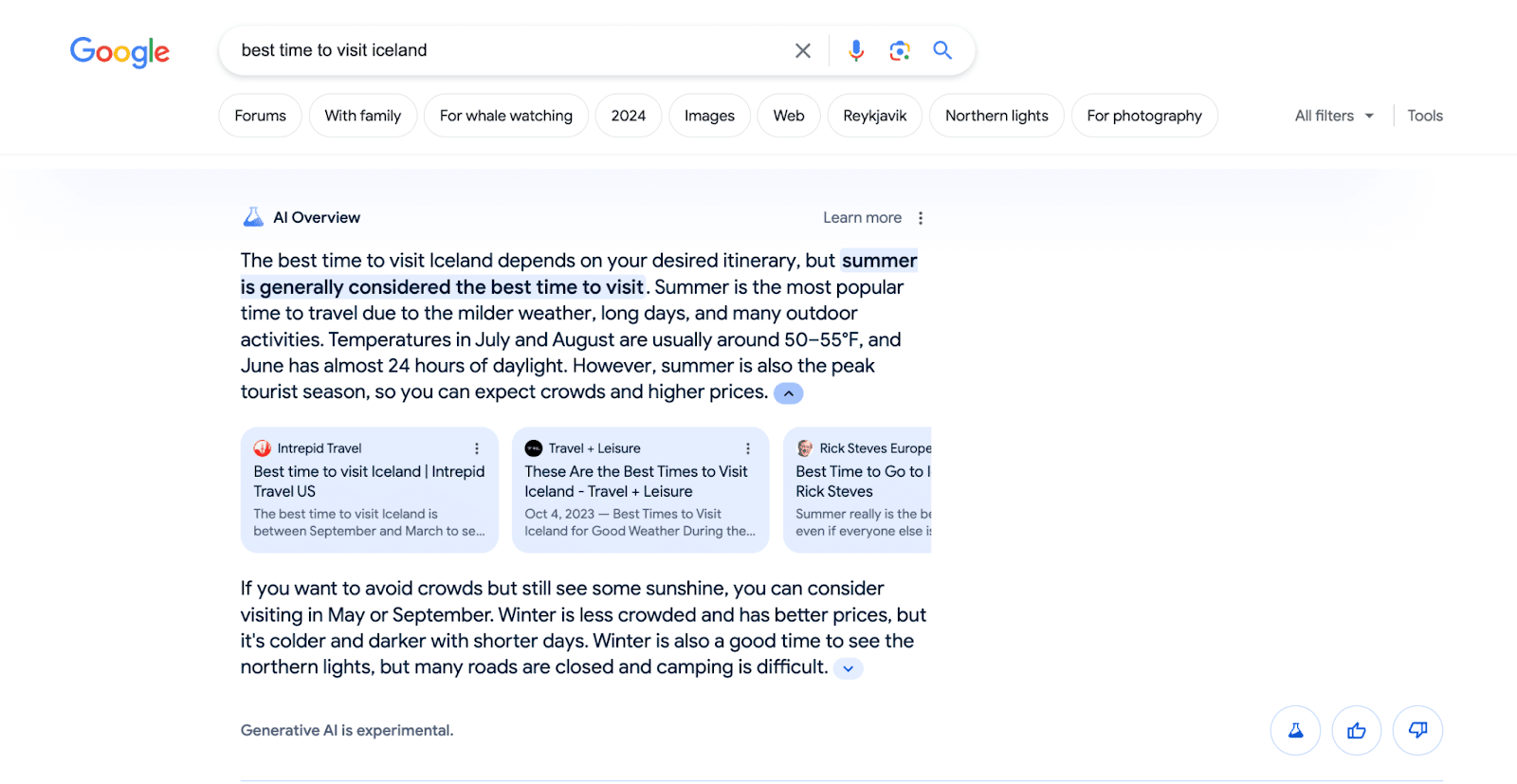
Bing is also actively using artificial intelligence to provide answers to user queries. In 2023, the search engine launched Copilot, an AI-powered assistant that can answer any query and provide website links to back its answers.
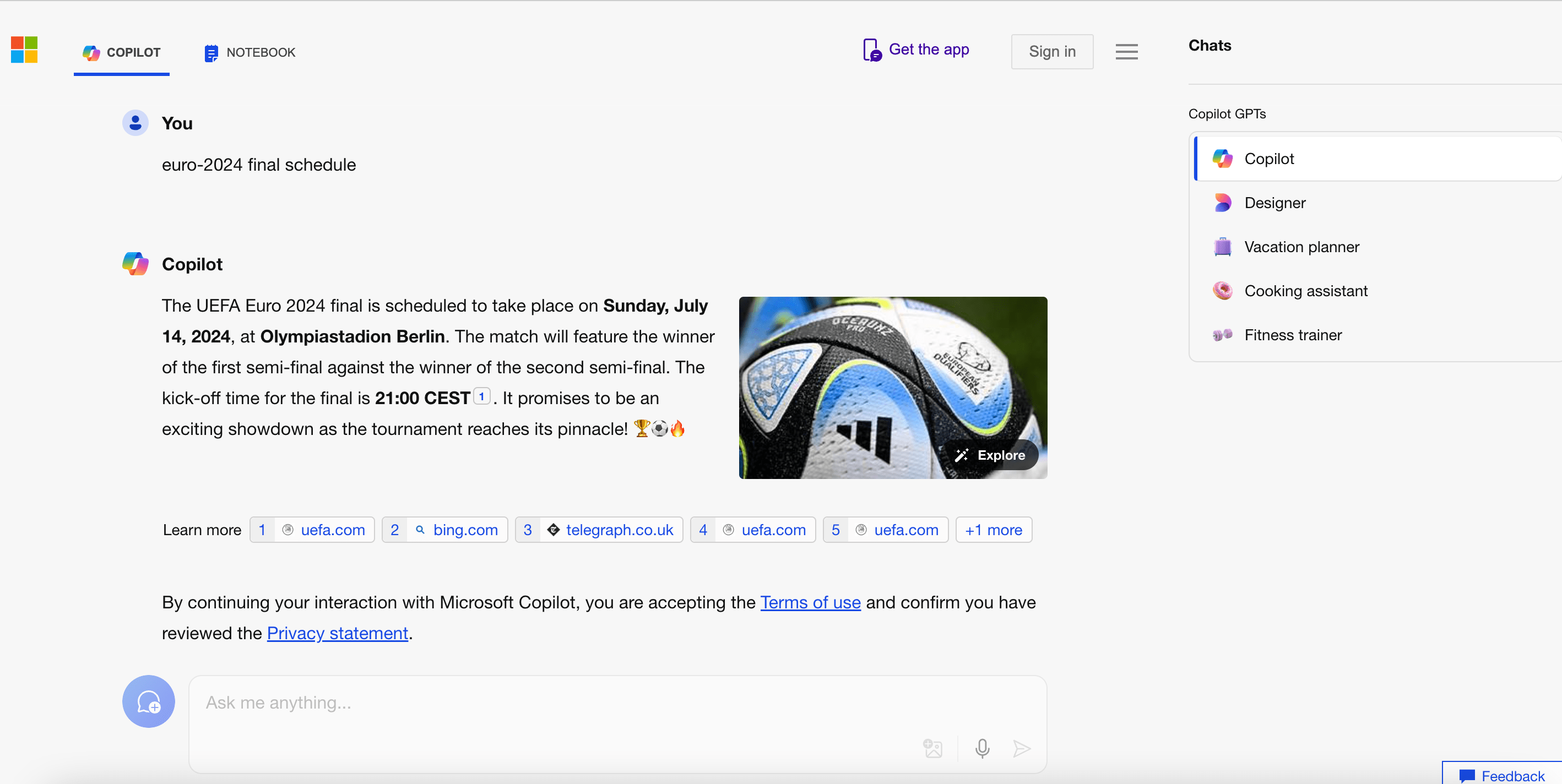
The last version of Copilot uses GPT-4o, which is OpenAI’s most advanced LLM. It also uses OpenAI’s text-to-image model, DALL-E 3.
The active implementation of AI in search engines began very recently, so this is likely the beginning. We will probably see the use of even more AI to generate search results in the future.
Using AI tools to automate SEO tasks
SEO professionals are using AI tools more often to automate SEO tasks and speed up their execution. This significantly saves team resources while delivering effective results.
Here’s how to use AI tools to automate different aspects of SEO:
- SEO analysis. AI-powered tools can assist with SEO competitor analysis and research when looking for keyword and topic ideas. These tools can identify your competitors, analyze them, and pinpoint high-potential keywords.
- Content creation. AI content tools can generate high-quality, relevant content at every stage, including creating article ideas and briefs, writing content, and checking its quality. This capability is useful for producing blog posts, product descriptions, and other text content.
- On-page optimization. AI software can also provide insights into a page’s performance for a certain query and offer a plan for optimizing that page.
- Technical SEO. SEOs also frequently use AI-powered tools for internal linking and generating schema markup with different prompts.
In the next section, we will explain how to use AI in each of the above-mentioned aspects of SEO. But first, let’s quickly explore which tools are necessary for AI-powered website optimization.
SEO AI tools
Nowadays, SEO pros use both standalone AI tools (such as ChatGPT, Gemini, and Perplexity) and SEO tools equipped with AI and ML technologies. This enables specialists to make website optimization more effective, intuitive and straightforward. Let’s quickly explore each tool to understand its impact and how it works.
ChatGPT
ChatGPT is an AI-based tool that helps generate text and images through machine learning. It runs on GPT-3.5, GPT-4, and GPT‑4o, which are the most recent and powerful LLMs (large language models) available. ChatGPT works through its Generative Pre-trained Transformer, which uses specialized algorithms to find patterns within data sequences.
OpenAI launched ChatGPT in November 2022. It triggered the AI boom worldwide. These days, it is difficult to find anyone in the marketing industry who hasn’t used ChatGPT at least once.
To this day, ChatGPT remains the most popular AI tool. It is used for a wide variety of purposes, and SEO is no exception. ChatGPT can provide you with a list of keyword ideas and content topics, create text for a page and check it for accuracy, generate markup, and write title tags and meta descriptions at scale. In fact, the capabilities of this tool are very powerful. The key is to build the right prompt as clearly as possible. For example, your prompt should include instructions that outline how you’d like to receive each output: lists, text, a code block, a table, etc. It’s also useful to define the needed role (e.g., an SEO with the right skills) and your target audience. Add references and resources to provide more context in your prompt.
Gemini
Gemini, formerly known as Bard, is a generative AI chatbot developed by Google. It is very similar to OpenAI’s GPT. It runs on LaMDA and uses a transformer architecture. Gemini relies on strategies like pretraining and fine-tuning, much like other major AI models. It was launched in February 2023.
Gemini can understand and generate text, videos, images, audio, etc. You can give Gemini any SEO-related prompt and receive an answer. Let’s take a closer look at its capabilities in the sections below.
The key distinction Google likes to highlight is that Gemini has a long context window. The longer the context window, the more text, images, audio, code, or video a model can process. Additionally, Gemini analyzes and creates images for free, which sets it apart from ChatGPT.
Perplexity
Perplexity is an AI tool and an alternative to traditional search engines, where you can directly pose your questions and receive concise, accurate answers with sources. Visually, it looks like Gemini and ChatGPT. It is used for a variety of purposes, such as content writing, researching, etc. And of course, you can also use it for SEO.
It was launched in 2022 and uses Anthropic’s Claude 3 Haiku and GPT-4o models combined with the company’s standalone LLM, which incorporates NLP capabilities. This means Perplexity AI combines the functions of a traditional search engine with the advanced capabilities of an LLM.
SEO tools with AI features
Nowadays, many software tools incorporate artificial intelligence into their systems, and SEO tools are no exception. For example, SE Ranking actively uses AI for text generation, traffic prediction, and online review analysis.
- AI Writer (included in SE Ranking’s Content Editor) is powered by advanced GPT-4o technology. With it, you get natural, human-like text that meets your unique requirements. Generate a raw draft of your content, edit it, and add your personal touch. You can also use it as a small text generator to create short copies that are ready to go live without additional editing.
- In its Competitive Research and Share of Voice tools, SE Ranking uses an ML-based traffic forecast calculator to show users the most accurate number of visitors to a website and separate pages.
- The Insights feature in SE Ranking’s Local Marketing tool uses AI to analyze the number of times a particular word or phrase was used across all reviews. It also uses AI to find term patterns. This feature will help you identify which aspects of this business need to be improved to increase customer loyalty and find topic ideas.
And now, it’s time to move to the most exciting part of this guide. We will go over the tasks you can effectively do with AI tools.
AI for SEO research
SEO research is the first step in website optimization, and AI helps with this in several ways, including competitor, keyword and topic research, and other data analysis. For certain types of research, you can use tools like ChatGPT. However, for competitor research or SERP analysis tasks, you’ll need tools dedicated to SEO.
Although AI algorithms effortlessly assist in analyzing extensive datasets and uncovering insights and patterns, it’s essential to ensure that AI tools accurately interpret your data. Remember to double-check your data to ensure accuracy.
Keyword analysis
To get a head start on keyword ideas, you can utilize ChatGPT, Perplexity, or Gemini. Use them to generate seed terms for your business or ideas for relevant terms. Note that these tools do not analyze SERP data to provide suggestions, an essential part of keyword research. That is why to conduct in-depth keyword research with accurate SEO metrics data, you should utilize dedicated SEO tools, even if they are not AI-powered. Specialized SEO tools are more accurate and provide essential metrics for each keyword, like search volume and keyword density. AI tools like ChatGPT lack this level of accuracy.
The ideal approach is to combine both AI and SEO tools for comprehensive keyword research. After obtaining seed keywords from ChatGPT, you can simply input them into SE Ranking’s keyword research tool. Within seconds, you will receive numerous suggestions and a comprehensive evaluation for each keyword, including metrics such as search intent, difficulty, search volume, SERP features, and more.
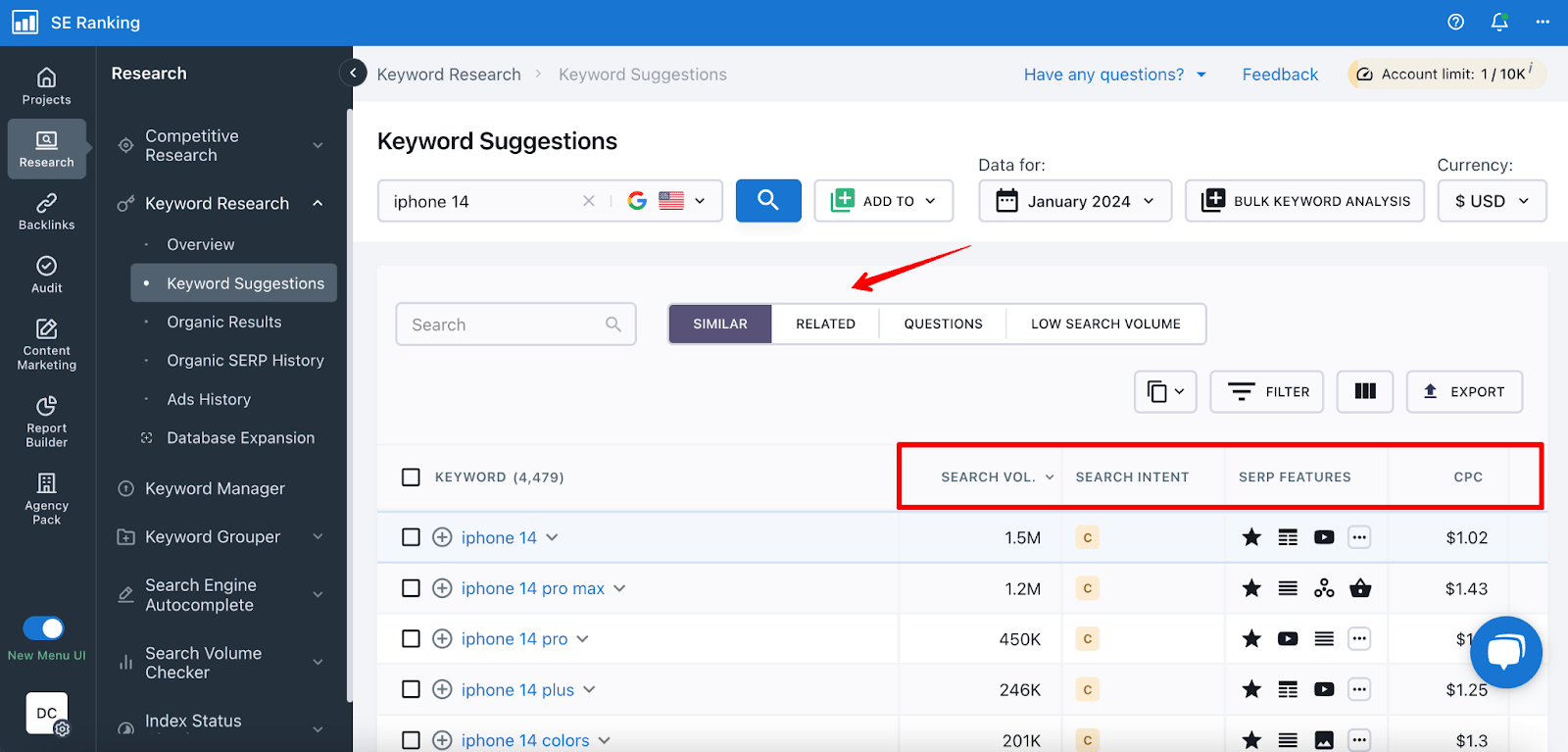
Certainly, SEO tools are constantly evolving, incorporating AI technologies into their features over time. For instance, SE Ranking recently implemented an AI-based formula to estimate organic traffic, making keyword (and competitor) research even more accurate. Our machine learning methods enabled us to analyze variable parameters such as SERP features, position fluctuations, and search intent. The algorithm we’ve incorporated into the platform continuously learns and adjusts to ensure up-to-date and reliable estimations of organic traffic. Our data is now 29% more accurate than previous estimations and is more closely aligned with data from Google Search Console.
For local businesses, SE Ranking offers an AI-powered Insights feature in its Local Marketing tool. This feature identifies frequently repeated terms in customer reviews, allowing you to select relevant keywords to incorporate into your content.
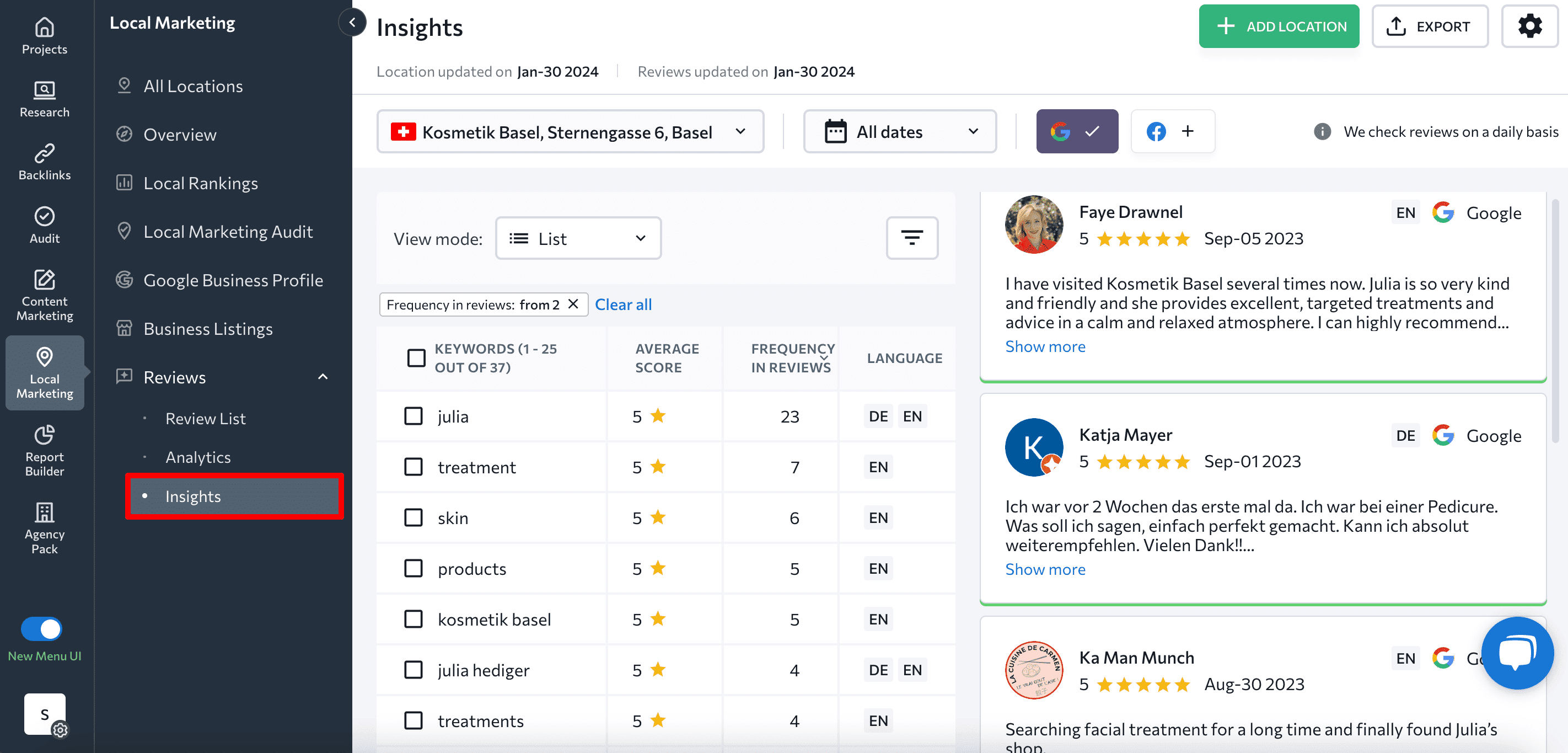
Researching content topic ideas
AI can identify emerging trends, consumer interests, and popular queries, making it an excellent tool for providing insights into which topics to focus on. It can even be useful in keyword clustering. You can use ChatGPT, Perplexity and Gemini for initial research by asking for prompts on a specific topic.
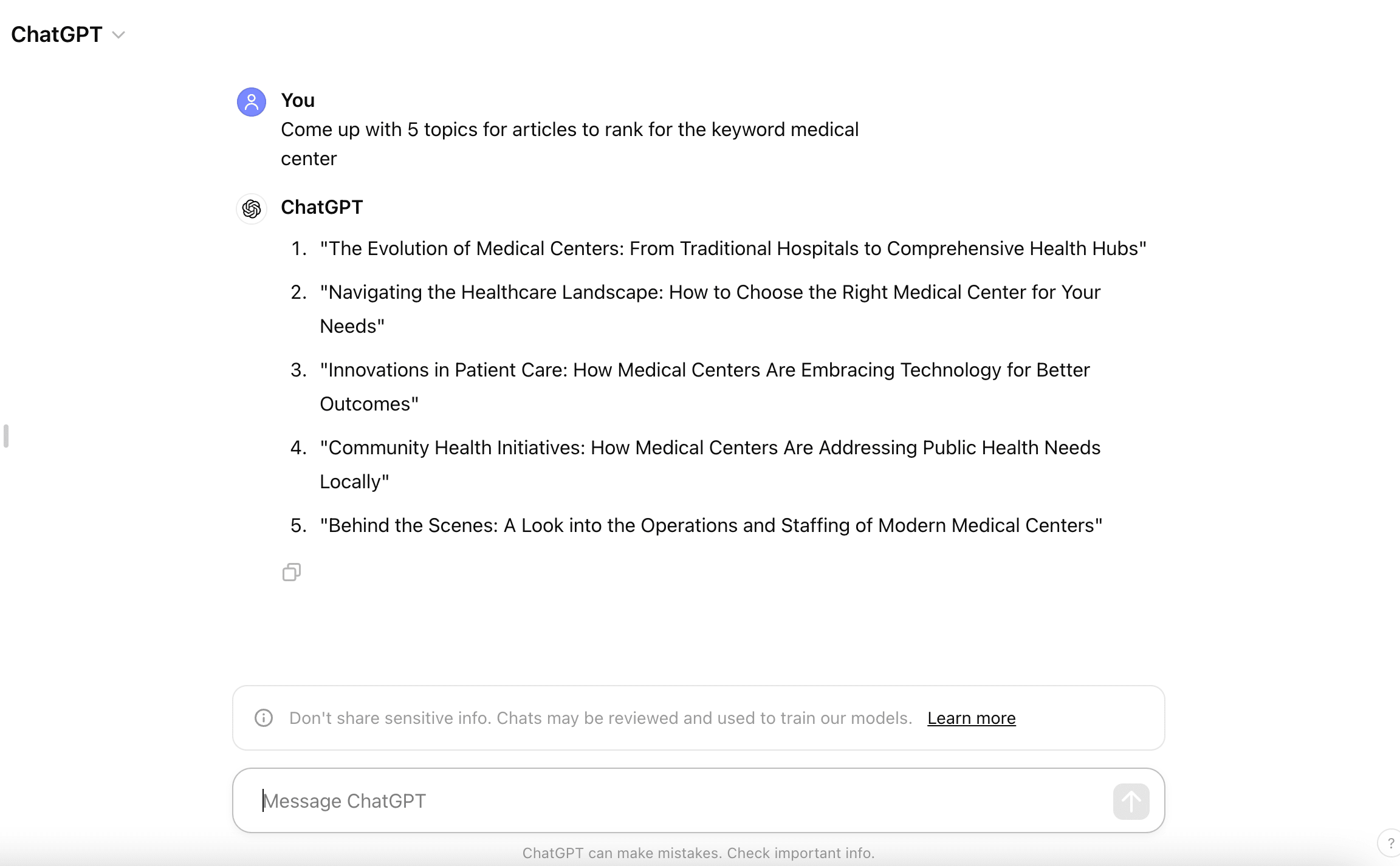
However, for SEO purposes, it’s not enough. This process involves understanding the topic’s potential, identifying focus keywords, and more. We recommend using SEO tools like SE Ranking’s Competitive Research tool. With this feature, you can analyze competitors’ top pages by traffic, identify the topics that attract the most visitors, and use them as SEO content ideas.
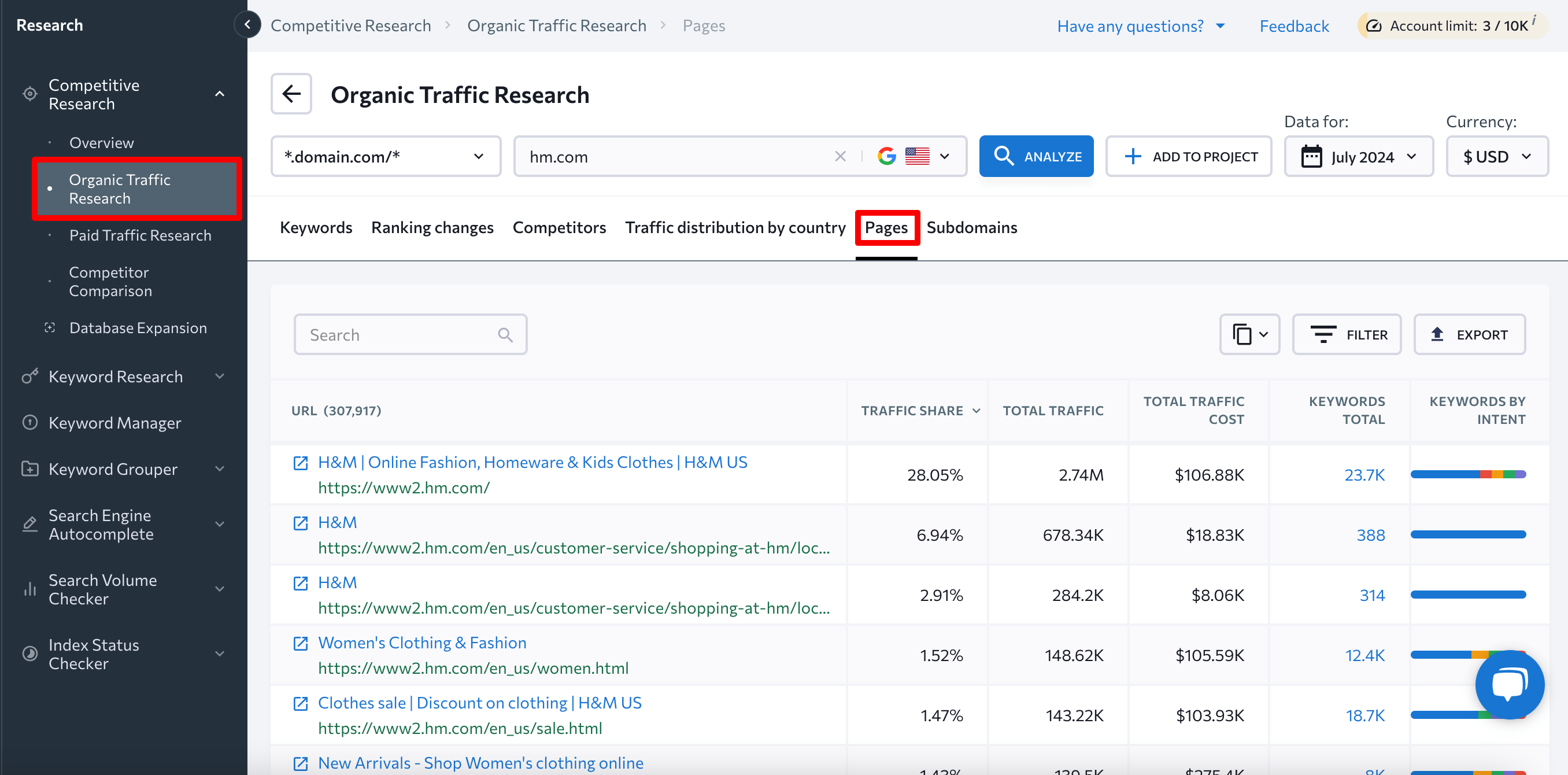
Competitor analysis
Understanding the competitive landscape is crucial for any business. AI-driven SEO tools can delve into competitor strategies, analyze SERP features, and provide insights into strategies that work well for industry peers.
With SE Ranking’s AI-powered Competitive Research tool and Share of Voice feature, you can discover how much traffic websites receive for specific keywords. This will give you an idea of which keywords to focus on.
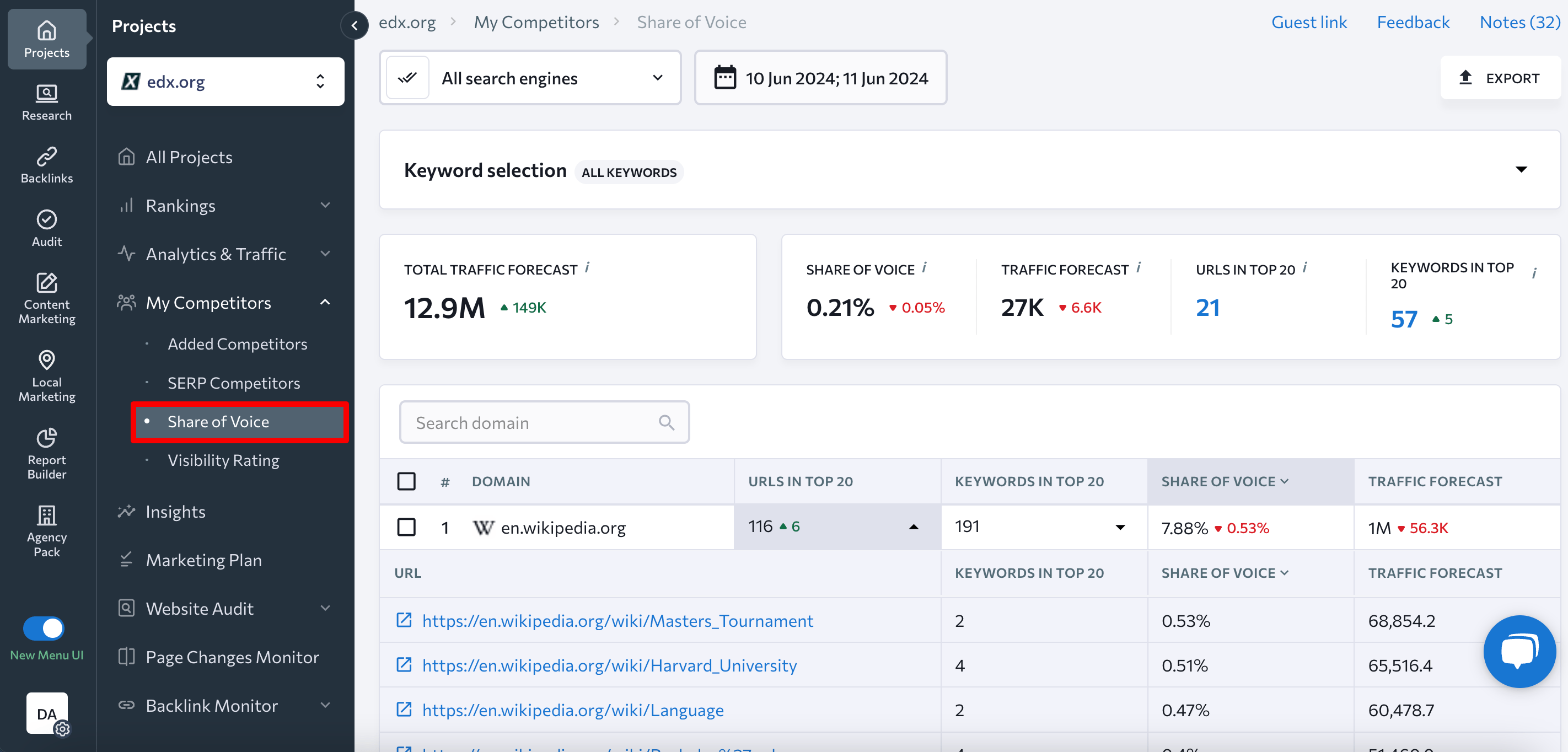
AI in content creation
Through its natural language processing and machine learning algorithms, AI generates high-quality, contextually relevant content. Artificial intelligence is beneficial across all stages of the content creation process, including planning, research, writing, and optimization.
Brief creation and content writing
Using AI speeds up the writing process for SEO and content teams when generating briefs, drafts, and edits. Now, specialists no longer need to face the terror of a flashing cursor on a blank page.
Here’s how it works. You just enter the task in ChatGPT, Perplexity or Gemini. The AI will generate a response in a matter of seconds. Let’s ask one of these AI-powered tools to create a brief for an article.

AI tools gather information from various sources on the internet, but they don’t analyze SERPs or provide additional SEO data that could be useful for generating well-ranking content. For this, you should use a specialized SEO tool that generates a clear text structure and suggests terms to include in the text, title, description, and heading structure. Also, make sure it defines content parameters, including text length, the number of headings, etc. For example, SE Ranking’s Content Editor tool excels in this area, providing suggestions and tips based on a thorough analysis of SERP competitors.
The tool utilizes AI technology to analyze the text of top-ranking websites. It suggests terms to use and displays their importance score.
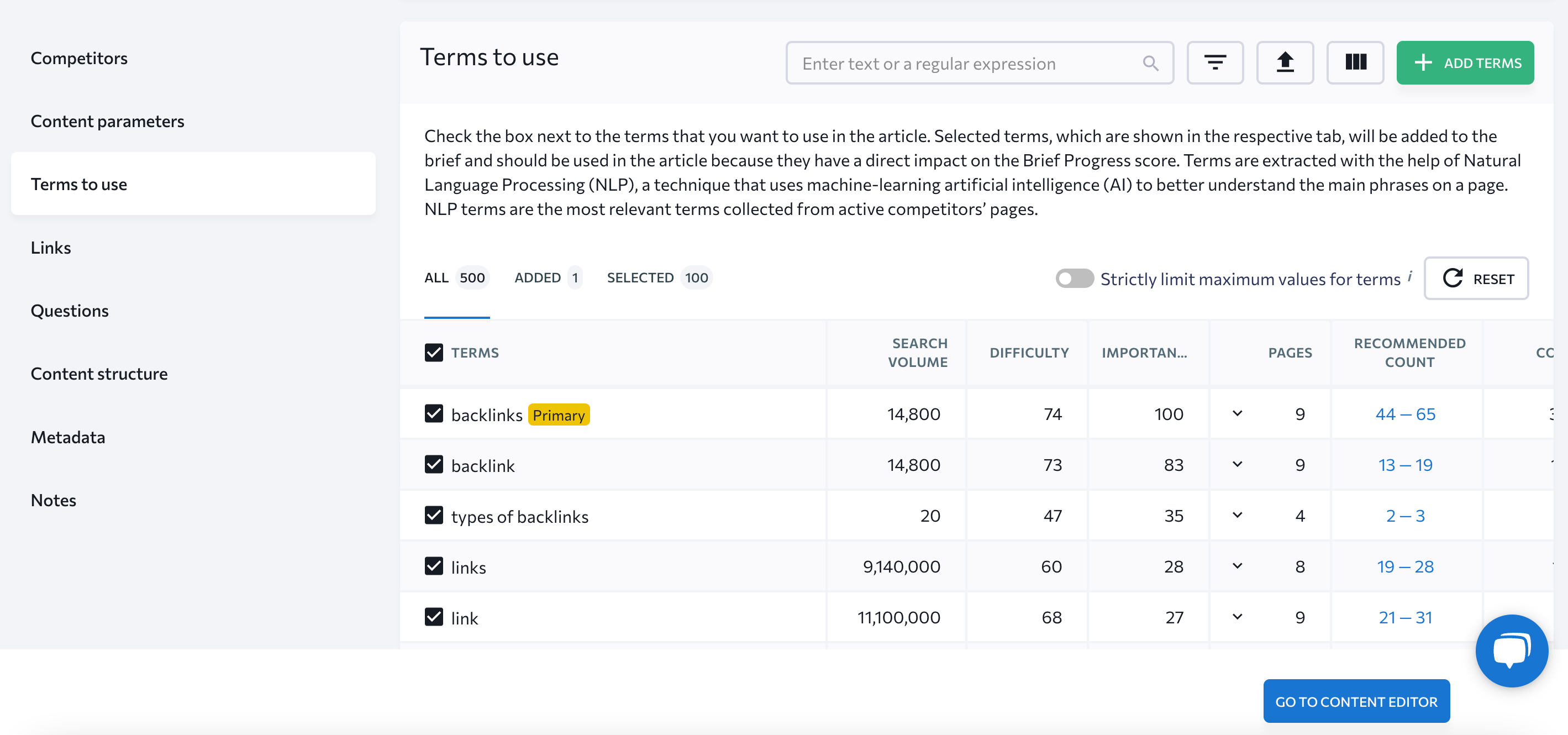
One of the most popular uses of AI tools in SEO is content generation. You can easily ask ChatGPT, Perplexity, or Gemini to do it. Don’t forget to specify your preferred tone of voice among other important details.
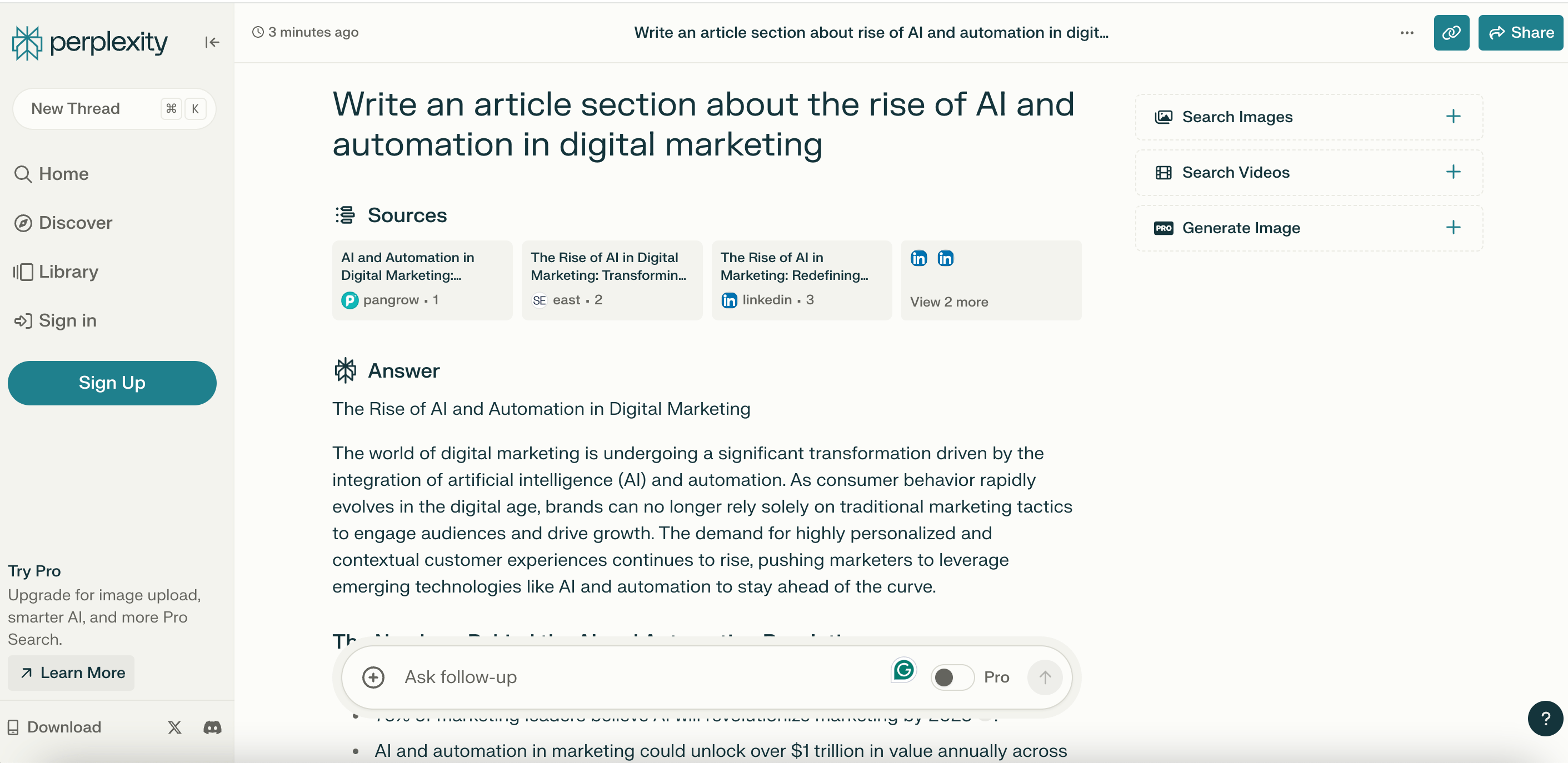
Specialized content editors are keeping pace with standard AI tools. For instance, at SE Ranking, we’ve created an AI-powered AI Content Writer.
Unlike conventional AI tools, SE Ranking’s AI Writer allows you to specify numerous additional details, enhancing the ability to generate highly relevant content tailored to your specific requirements. For instance, you can specify user intent, content format, target audience, and your desired tone of voice. You can also add personal details for the AI to consider during article generation.
As a result, you will receive a complete article that only needs a slight human touch. Although conventional AI tools like ChatGPT often struggle to generate fully comprehensive articles, this isn’t an issue for SE Ranking’s AI Writer. This tool even assists you with avoiding the detection of generated content.
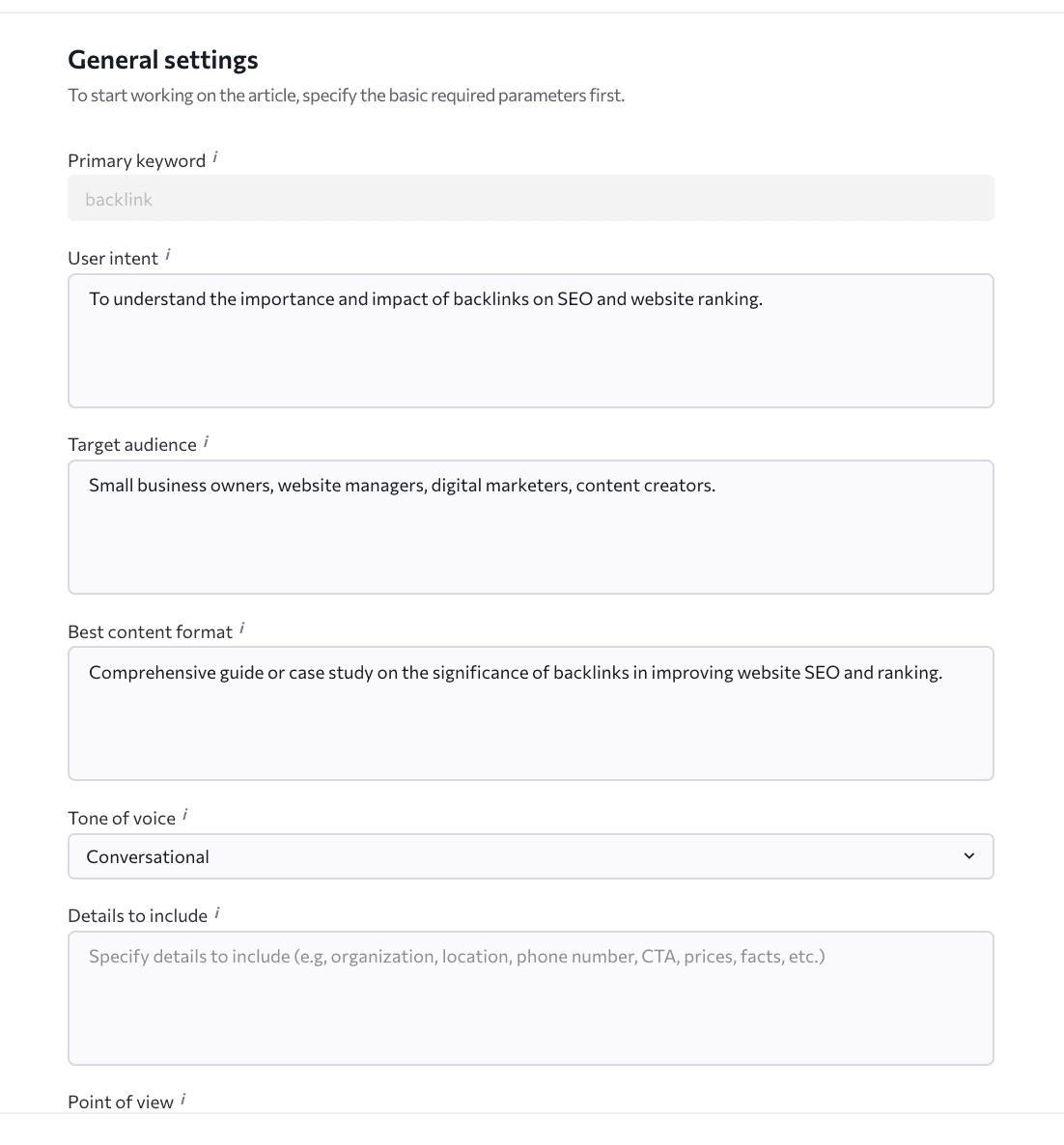
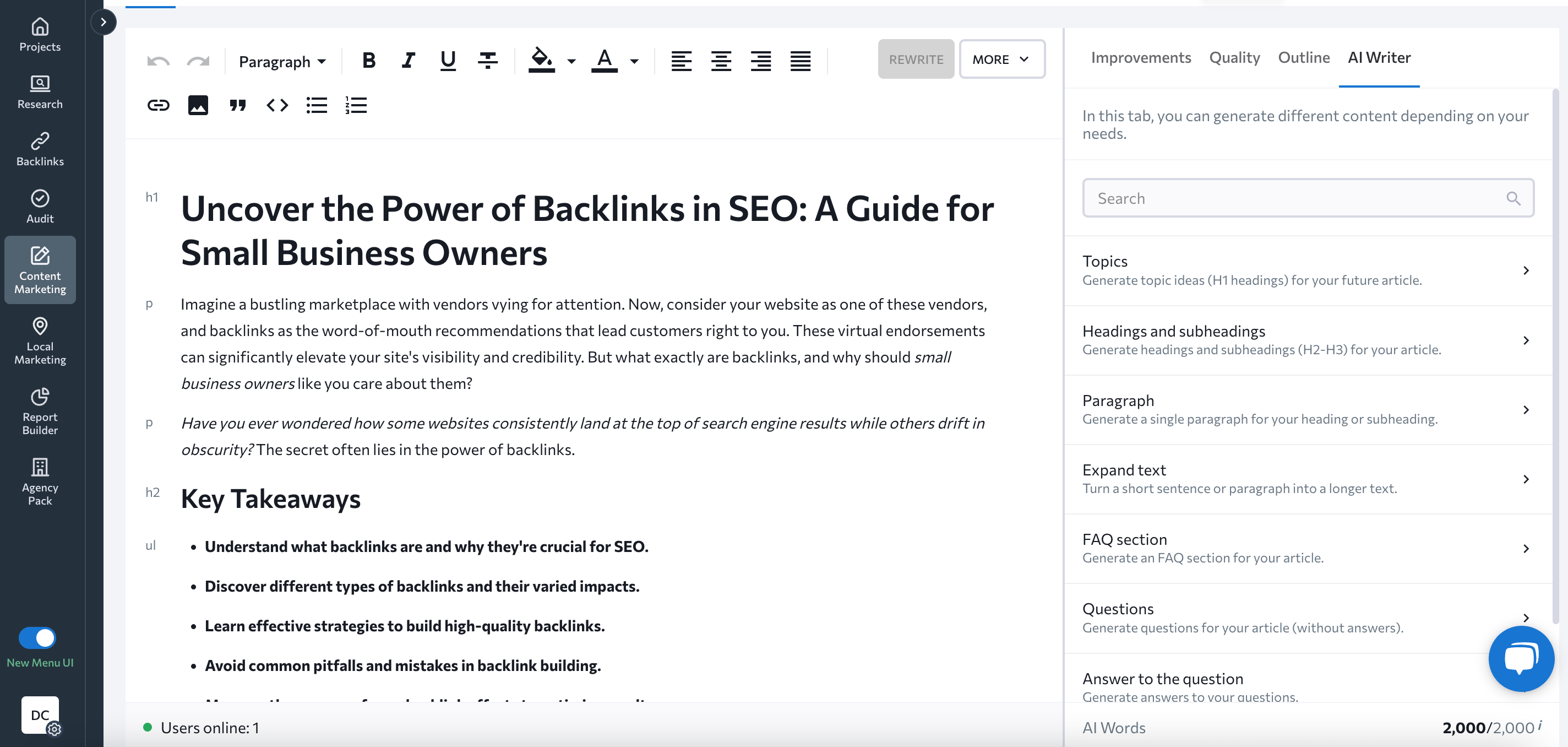
Writing a 2500-word article draft will take approximately 30 minutes, with minimal editing required.
We recently used our AI Writer to create two articles: one on seed keywords and another on the difference between dashboards and reports. Check them out and evaluate the results of using AI.
Note: While AI is actively involved today in content production, use it cautiously. Don’t depend on artificial intelligence alone. Letting an AI create an article from scratch without human research, checks and edits won’t work. Content must be unique and bring something new to users. This is the kind of content that Google wants to see at the top of organic search results. Since AI tools just gather and mix data from various sources, they can’t create unique insights. Moreover, AI SEO tools are imperfect. They often make mistakes, including presenting false information, and incorrect grammar. AI may even overlook crucial points for topic elaboration. In other words, AI-generated texts or briefs can serve as a foundation for further work but not as ready-made content.
Content and on-page optimization
After the text is finished, check if it is high-quality. AI tools can easily identify grammatical, lexical, and stylistic errors. ChatGPT, Perplexity, and Gemini are great at checking the text for any of the mentioned issues; just ensure that the text doesn’t lose its human touch after asking the AI to proofread it.
The next stage is to ensure the text and on-page elements are well-optimized for SEO. You can check it using the Content Helpfulness and Quality SEO Analyzer in ChatGPT, developed by Aleyda Solis. Simply input the URL of your page or the specific text for analysis, along with your target keywords. Optionally, you can include content from your competitors’ pages. The GPT will provide a comprehensive analysis of your content that evaluates its helpfulness, relevance, and overall quality. It will highlight areas where your content excels or falls short compared to your competitors.
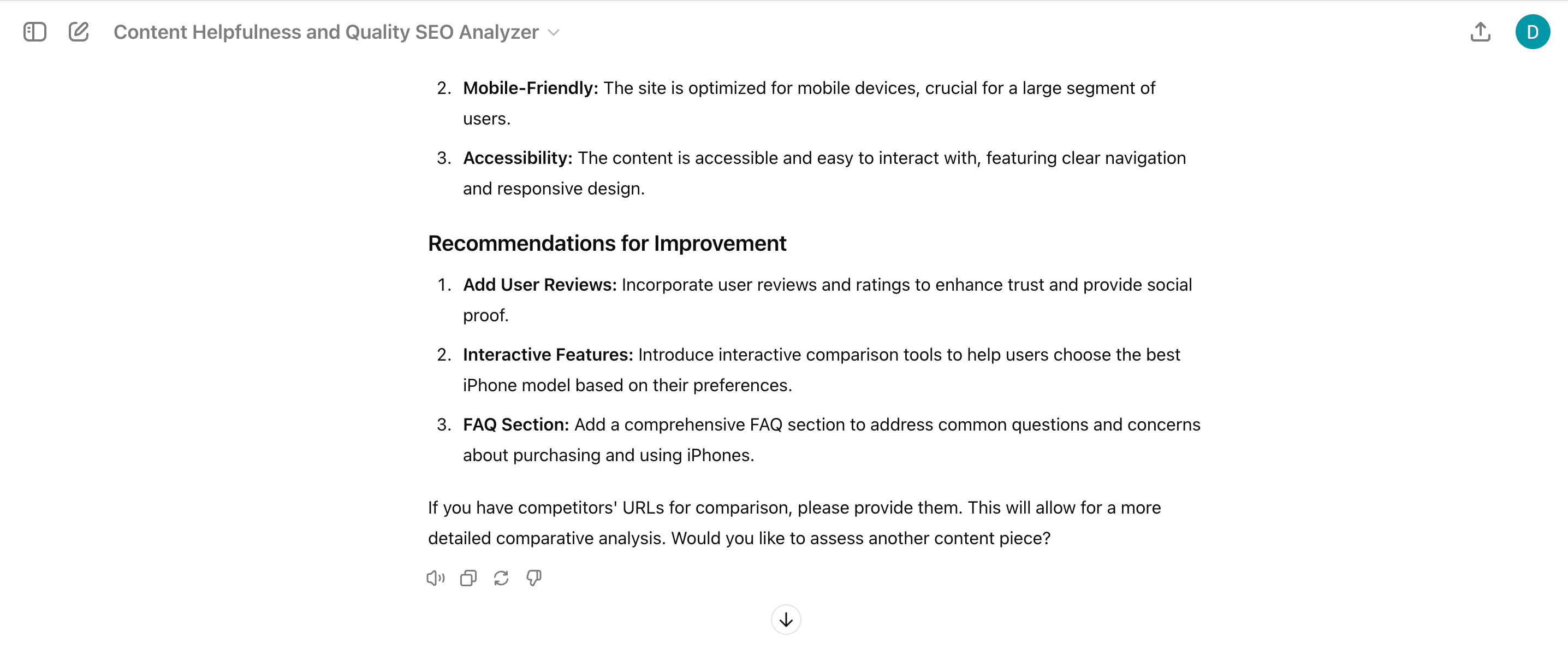
But keep in mind that ChatGPT is not primarily designed to handle SEO tasks. To achieve the desired results, you should use dedicated SEO tools like our On-Page SEO Checker. This tool evaluates how well a page is optimized for a specific query, compares it with the top competitors, and helps you develop a personalized plan to improve rankings. It provides a complete list of errors and offers recommendations for enhancing your page score.
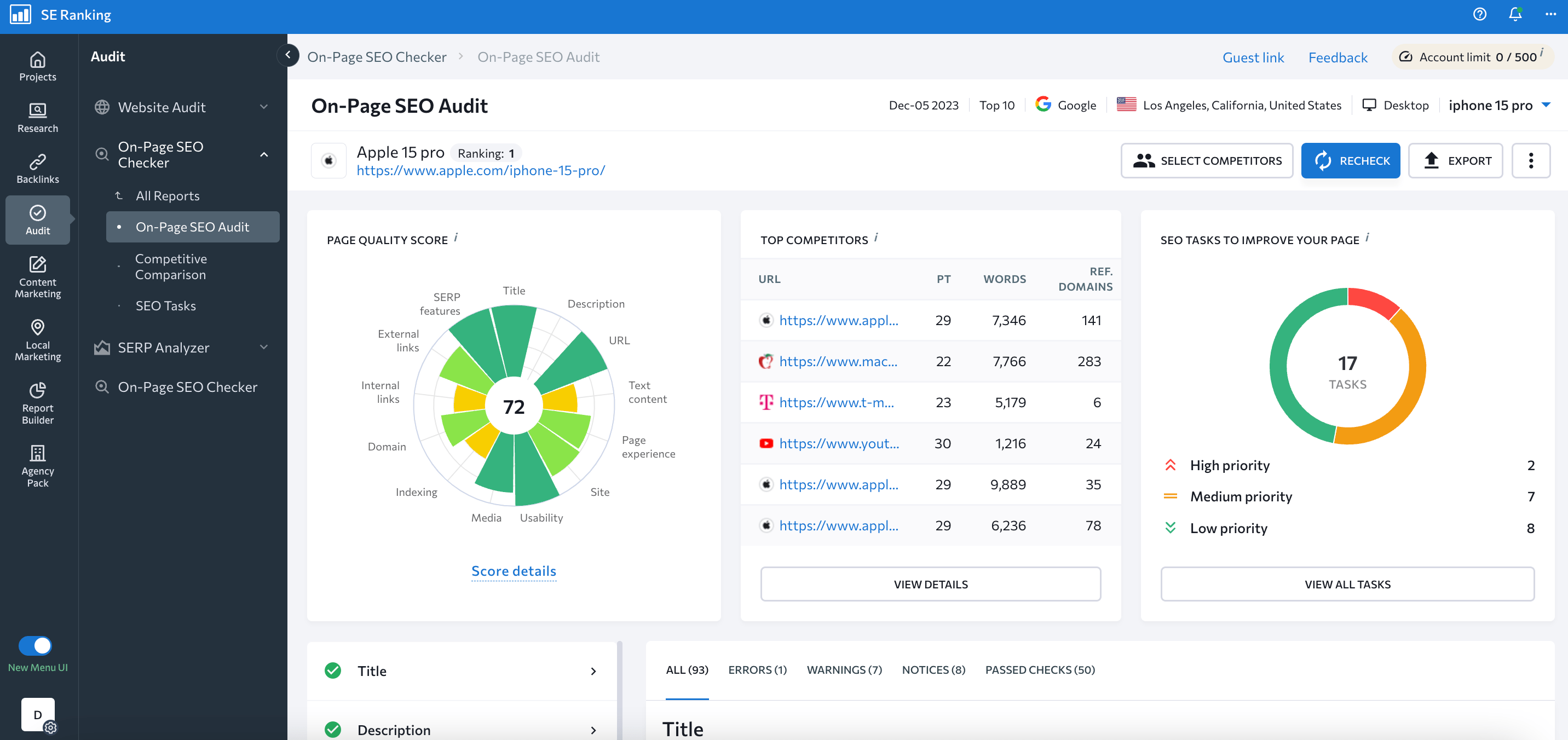
AI in technical SEO
For technical optimization, you can also utilize AI SEO tools for internal linking, implementing markup, and handling various small technical-related SEO tasks, such as creating the right XPath expression for analyzing page elements, etc.
Internal linking
AI tools help analyze and visualize large datasets, which assists in conducting a comprehensive analysis of internal site linking.
Here’s a simple way to use AI for internal linking: export all links from an SEO tool and then provide them to an AI tool like ChatGPT for analysis.
Upload exported data to ChatGPT ▶️ Try different prompts and requests as explained by Anna Matviienko in her guide.
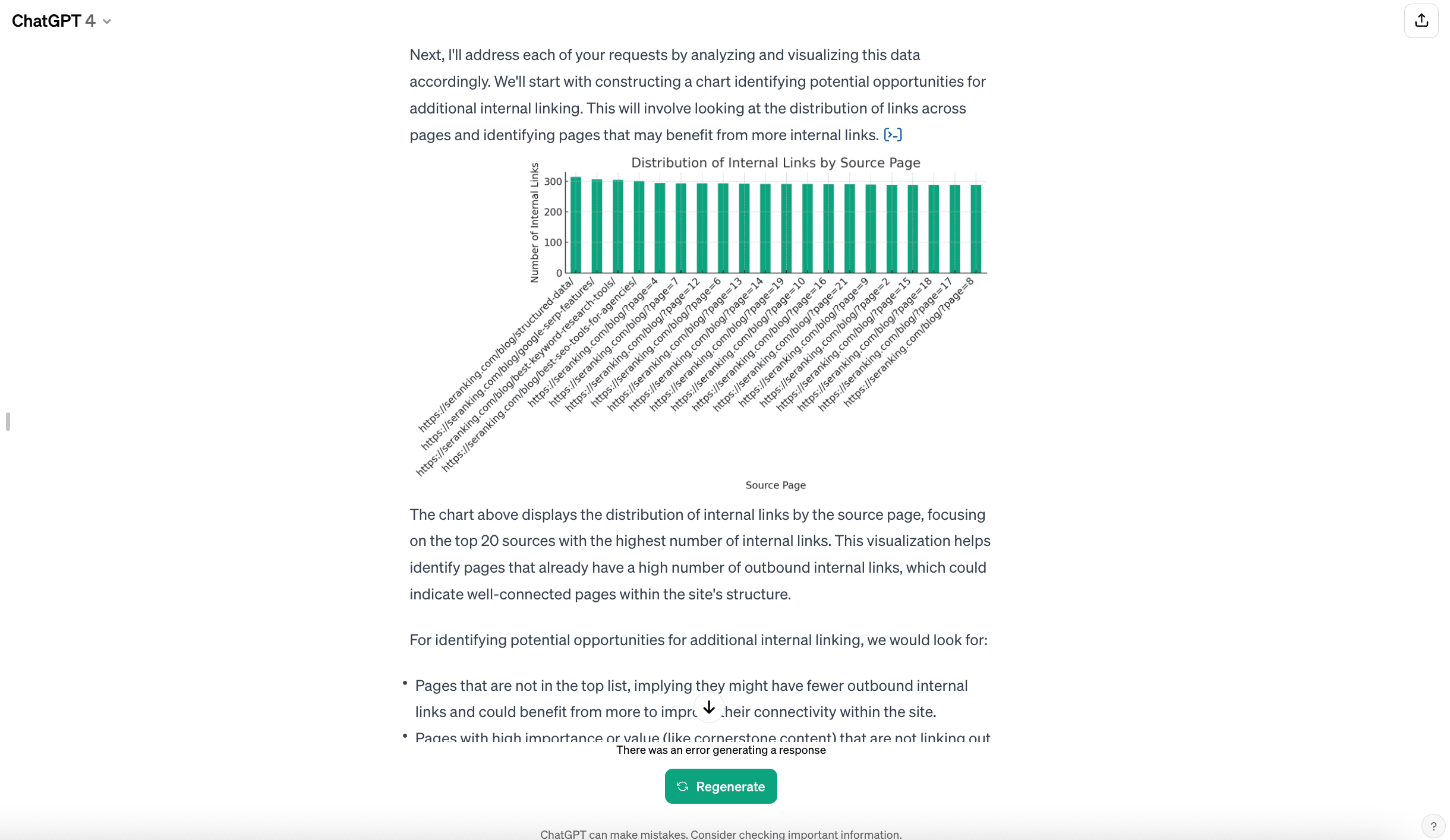
Generating schema markup
Implementing schema markup can enhance how search engines interpret and display your content in SERPs. This results in more informative and visually appealing snippets. AI tools can assist in generating schema markup within minutes.
Use a prompt in ChatGPT to obtain a ready-made schema markup code. Here is an example provided by Itamar Blauer, the senior SEO director at StudioHawk.
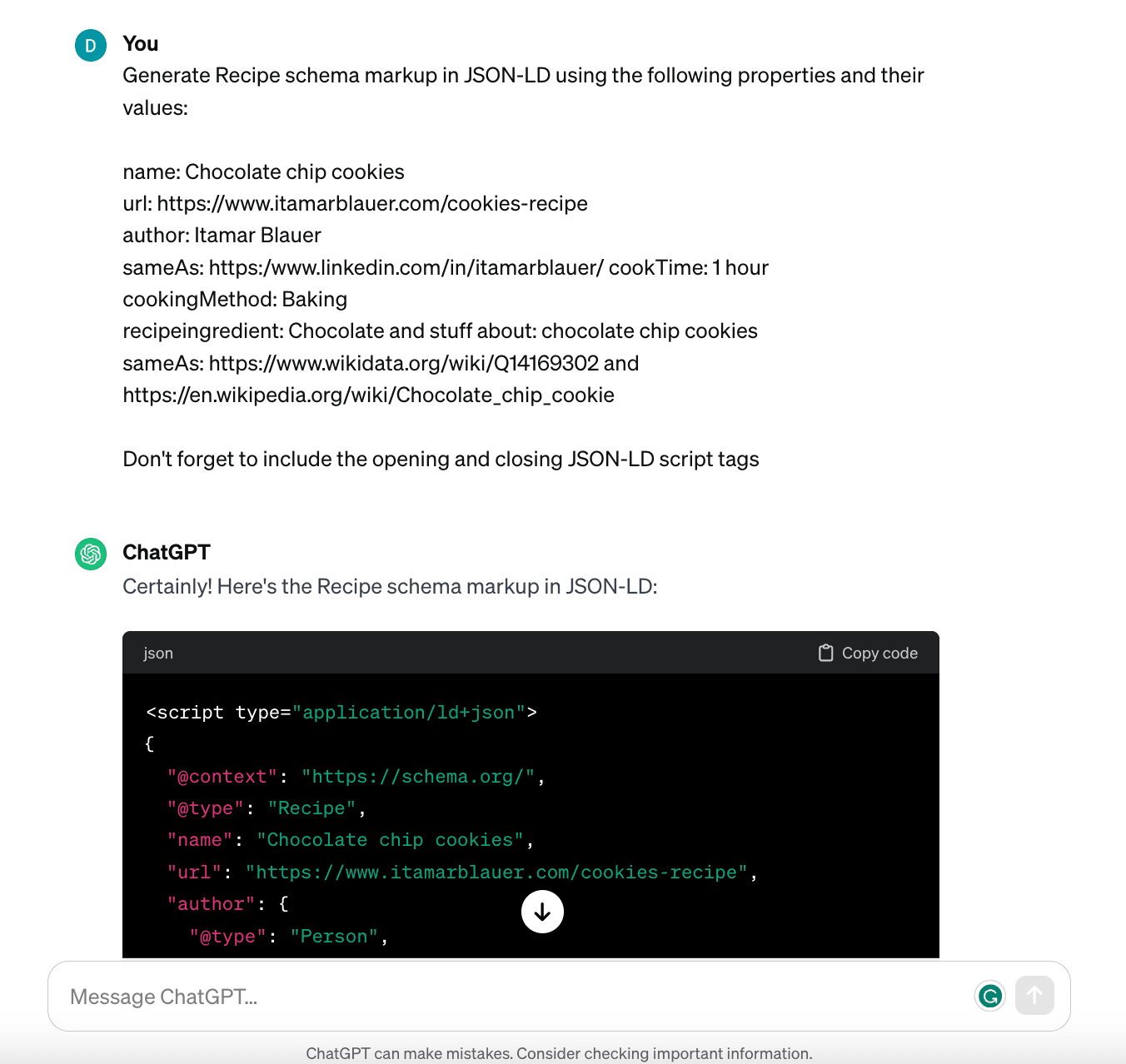
You can also use other AI-powered schema markup generators like AlliAI and WordLift.
When implementing structured data in your content, we recommend using Google’s official testing tool. This ensures that search engines correctly interpret and display your content.
Other SEO fields to implement AI in and the potential risks
We already described the main tasks every SEO team tackles with artificial intelligence assistance, but AI can also be used in other areas, such as local SEO and voice search optimization. For these purposes, AI can analyze local search patterns and help you understand regional preferences or find the right local queries.
However, we believe that predictive analytics and reporting are the most crucial areas of use for AI in SEO. For instance, AI can help you forecast website performance metrics or understand the seasonality patterns better. These insights are useful for building an SEO strategy for your clients. Plus, being able to analyze vast amounts of data, AI will help you generate comprehensive reports with all the necessary information. These two activities are essential but certainly not every SEO expert’s favorite task. It’s worth looking into ways to automate them with AI.
So, AI is not perfect. Sometimes it’s best to let humans do the work. Here’s why:
- AI tools can generate incorrect data.
- AI might cause plagiarism issues, as it often creates content similar to existing material.
- AI-generated content lacks the creativity and unique perspective that humans bring. It can cause issues with E-E-A-T signals, which are essential page quality factors for Google.
- AI tools may provide incorrect or even harmful information, which can hurt the website’s credibility and visitors’ trust. This impacts YMYL niches the most, where the accuracy and expertise of information directly impact rankings.
To avoid these problems, use AI as your assistant, not as a substitute for you. Constantly check and edit the generated content, and add your personal touch and expertise.
